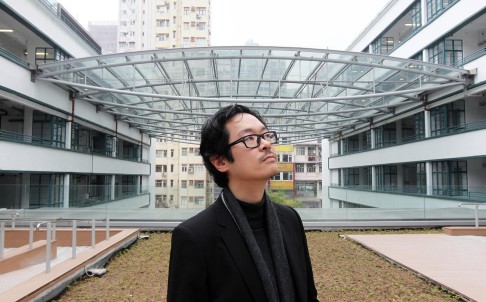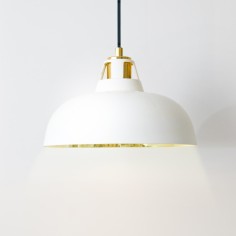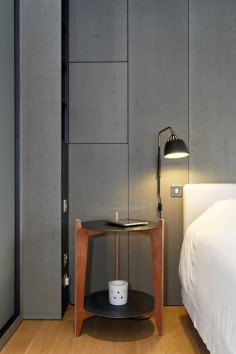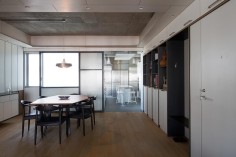Architect Billy Tam at the revamped PMQ studios in Central. The buildings formerly housed police officers and their families. Photo: May Tse
Former police married quarters in Central reborn as design hub PMQ
A former police married quarters has been reborn as PMQ, a studio complex for designers intended to foster cross-fertilisation of ideas
Hong Kong's design scene is thriving, but like many of this city's creative endeavours, it exists beyond the spotlight, in old factory buildings and back alley studios. That could soon change.
After two years of renovations, the former police married quarters in Aberdeen Street, Central, has been reborn as PMQ, a design hub that aims to raise the public profile of local design by giving designers more opportunities to build their own brands.
"It's a project that nobody has done before," says William To, PMQ's creative director, who is also project director at the Hong Kong Design Centre. "It will attract all sorts of designers from different disciplines to come and interact with each other and the public."
Built in 1951 to house police officers and their families - including former chief executive Donald Tsang Yam-kuen, who grew up in the complex - the PMQ now contains 130 design studios, along with shops, restaurants, a library, exhibition space, a rooftop garden and outdoor gathering areas. When it opens in stages starting next month, it will contain a mixture of well-known brands like Vivienne Tam alongside up-and-comers such as Fungus Workshop, a leatherworking studio.
Studio spaces are small (about 450 sq ft) but To says the goal is to foster a community, not to create an office complex. Spacious open-air corridors in front of each unit will be used for exhibitions and pop-up events; there will be a co-working space and units for overseas designers-in-residence; and tenants must keep their doors open to the public from 1pm to 8pm every day.
"In the past, everyone lived together and the most important space in the building was not the dormitory units, it was the common areas, the verandahs and shared kitchens," says architect Billy Tam Hon-wah, a director at Thomas Chow Architects. "It was a residential community and now it's a community of designers - so it's kind of the same thing."
Tam designed the PMQ's original concept and now works as a consultant to the government's Architectural Services Department, which renovated the complex. He will occupy one of the PMQ's units, where he plans to host regular exhibitions.
Though some tenants are more service-oriented, like Tam, others designers will use the PMQ as a platform to develop their own brands and retail businesses. That is the case for C'monde, a design studio run by Johan Persson, an industrial designer and design consultant who moved to Hong Kong from Stockholm eight years ago, in order to be closer to Chinese factories.
"I'm going to use the space for pop-up stores," says Persson, whose portfolio includes headphones for Swedish clothing brand WeSC and Butchers Deluxe, a 2010 project that invited Hong Kong artists and designers to create their own versions of the iconic red lamps that hang in every wet market.
He says he is especially happy about the PMQ's entrepreneurial focus, which he thinks is the best chance for young Hong Kong designers to become successful, since the hierarchical nature of most local companies stifles innovation. "The people there are taking the same chance as me - those are the people I'd like to be surrounded by," he says.
Persson also hopes the PMQ will foster collaboration between designers, especially local and expat designers, who sometimes seem to operate in different universes. For that reason, he says he is thinking of reviving Butchers Deluxe once he moves to the PMQ. "Things are pretty fragmented right now, so I hope that this can allow people in the creative community to learn from each other," he says.
Collaboration will be the focus of G.O.D.'s space in the PMQ, which the local lifestyle brand will partly use for a restaurant - the brand's first foray into the food business. G.O.D. has begun working with outside designers to produce new products, such as a recent fashion collection developed with a Chai Wan-based practice. "We'd like to take this collaborative process and really launch it at PMQ," says G.O.D. founder Douglas Young.
For Gene Miao, founder of the architecture and interior design firm 1:1 Limited, PMQ will offer a space to showcase his two latest projects: leather bags and a collection of furniture made with salvaged and surplus construction materials in addition to plywood. He plans to keep his current space in Kowloon Bay as a "production studio" while using his new PMQ studio to reach out to the public. "There's so much foot traffic, which you would never get in Kowloon Bay," he says.
Miao is also curious to see what opportunities the PMQ will open for collaboration. "It's an opportunity for all these different design disciplines to gather," he says. "But when it comes to collaborations, you can't force it," he cautions. "You kind of have to see how it goes."
William To says the PMQ will be building its community "one step at a time". A series of events will take place over the next several months to introduce the complex to the public, including a night market run by the organisers of Island East Markets, which will start on April 18. "We're already feeling a really positive energy," says To.
PMQ opens on April 14. For more information, visit pmq.org.hk
This article appeared in the South China Morning Post print edition as Collaborative hopes of creative community




沒有留言:
張貼留言